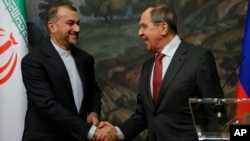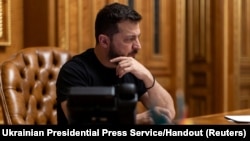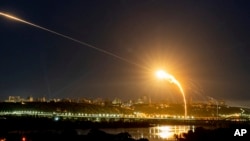The British Defense Ministry said Monday in its daily intelligence report on Russia’s invasion of Ukraine that the invasion has resulted in international isolation, forcing Russia to “redirect its foreign policy efforts” and form alliances with “previously less desirable partnerships” for “diplomatic, economic and military support.”
In the report on X, formerly known as Twitter, the ministry said Russia’s diplomatic and economic ties with Iran have strengthened since the invasion. Iran’s military aid to Russia has included hundreds of the one-way attack uncrewed aerial vehicles that have been a core element of Russia’s campaign in Ukraine, and these are now being produced under license in Russia.
A new warning Sunday that the Kremlin “is already and will likely continue to exploit the Hamas attacks on Israel” to hype its rhetoric against Western interference in Ukraine, demoralize Ukrainians and reassure Russians that the focus of the West on the Israeli crisis will deflect its attention from the war in Ukraine, according to the Institute for the Study of War (ISW).
Following Hamas attacks in Israel on October 7, the Kremlin primarily blamed the West for neglecting conflicts in the Middle East in favor of supporting Ukraine, and claimed that the international community will turn its attention to the Middle East crisis and will cease to focus on Ukraine.
Dmitry Medvedev, the deputy chairman of the Russian Security Council, said that the United States and its allies should be "busy" with work on a "Palestinian-Israeli settlement" and not "interfere" in Russia's affairs and provide military aid to Ukraine,the ISW reports.
Prominent Russian propagandist Sergei Mardan and other Russian news bloggers aim to influence their audience and to demoralize Ukrainian listeners by stating that Russia will benefit from the escalation in Israel as the world “will take its mind off Ukraine for a while and get busy once again putting out the eternal fire in the Middle East,” ISW said. The group added that the Kremlin narrative that Ukraine will lose international support is intended to reassure Russian audiences that the international society will ignore Ukraine’s war effort.
Reacting to the Hamas coordinated attacks against Israel Saturday, Ukrainian President Volodymyr Zelenskyy reminded the world during his nightly video address — to stand firm against terror wherever it emerges.
“Terror has opened too many fronts against humanity. The war against Ukraine. The war in the Middle East. Terrible destabilization in Africa. Constant attempts to provoke a crisis in the world food market. Being strong in such conditions means standing up to terror. It is not enough to be a great country. It is not enough to be a rich country. It is not enough to have ambitions. To be strong is to help protect people and lives from all forms of terror. And that is exactly what it is. To help,” he said.
Zelenskyy held an emergency phone call with Israeli Prime Minister Benjamin Netanyahu Sunday, about the situation in Israel and the actions of the armed forces and law enforcement agencies to repel the attack.
He expressed Ukraine's solidarity with Israel and offered condolences over the numerous victims.
Russian drones - winter
Ukraine’s air force expects an onslaught of Russian drone attacks this winter, spokesperson Yuriy Ihnat said Sunday, as Kyiv braces for a second winter of mass bombardment of its energy infrastructure.
Ihnat said that data for September showed the use by Russia of Iranian-designed Shahed kamikaze drones would dwarf last year's figure.
"This autumn and winter ... is already a record in terms of the number of Shahed drones. Over 500 (were used) in September," Ihnat said in an interview on national television.
He juxtaposed this number with Russia's airstrike campaign on Ukraine last winter, when he said, about 1,000 Shahed drones were used in six months.
Attacks on energy facilities last winter damaged a significant part of Ukraine’s power system and forced most cities to ration electricity and hot water.
Despite Ukraine bolstering its air defenses, officials have warned of the risk of another failure this winter of its power grid which is far from rebuilt after the last campaign of bombardment.
A 27-year-old woman and her baby were among a dozen people wounded in a Russian attack in Ukraine’s Kherson region, the regional governor said Saturday.
United Nations investigators are in the Ukrainian village of Hroza, where a Russian missile strike this week killed 52 people during a wake for a slain soldier being held at a café.
The lead investigator said in a statement, “My initial conversations with local residents and survivors indicate that virtually all those killed were civilians and that the target itself, a busy village cafe and store, was also clearly civilian.”
Among the dead were the village leader, a couple who left behind four children and the dead soldier’s wife and son.
Russia's new silo-based intercontinental ballistic nuclear missile system is nearly combat-ready, Defense Minister Sergei Shoigu said Saturday, after he inspected the manufacture of Sarmat missiles, one of Russia’s most advanced weapons.
"Re-equipping the Strategic Missile Forces with this system, which will become the basis of Russia's ground-based strategic nuclear forces, is a priority in ensuring the country's defense capability," Shoigu was quoted as saying.
His comments reflect Russia's escalating nuclear rhetoric in its standoff with the West over the war in Ukraine.
Known to NATO military allies by the codename “Satan,” the Sarmat missiles reportedly have a short initial launch phase, which gives little time for surveillance systems to track their takeoff.
On Friday, the Russian parliament speaker, Vyacheslav Volodin, said lawmakers will reevaluate whether to revoke the ratification of the Comprehensive Nuclear Test Ban Treaty, or CTBT, a global nuclear test ban.
Volodin’s statement came after Russian President Vladimir Putin warned that Moscow could consider rescinding the ratification of the international pact since the United States never ratified it.
The 1996 treaty prohibiting “any nuclear weapon test explosion or any other nuclear explosion” anywhere in the world has been signed by 187 nations but not ratified by eight of them, including the United States.
The U.S. did not ratify the treaty, but it has observed a moratorium on nuclear weapon test explosions since 1992 that it says it will continue to abide by.
"It would be concerning and deeply unfortunate if any state signatory were to reconsider its ratification of the CTBT," Comprehensive Nuclear Test-Ban Treaty Organization Executive Secretary Robert Floyd said in a statement.
There are widespread concerns that Russia could move to resume nuclear tests to try to discourage the West from continuing to offer military support to Ukraine.
Some information for this report came from Reuters and The Associated Press.







